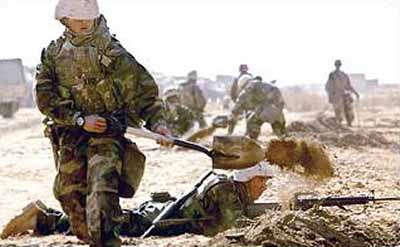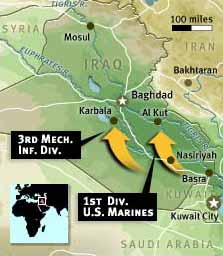
U.S. Marines dig
trenches Thursday to protect a military convoy
following Wednesday's
attack on the road, about 90 miles
north of Nasiriyah. |
With the skies
finally clear after two days of sandstorms and good weather forecast for
the next few days, U.S. commanders said allied forces would quickly intensify
pressure on the Iraqi military Thursday. Meanwhile, U.S. warplanes wiped
out a large convoy of Iraqi troops near Najaf early in the day as it approached
the 3rd Infantry Division.
“YOU’LL CERTAINLY
see us increase in our activity in the coming hours, days, given the clearing
weather,” an official at U.S. Central Command said, speaking on condition
on anonymity.
|
The worst sandstorm
in the region in decades, with winds whipping at 50 mph and upward, began
Tuesday and stalled thousands of U.S. and British soldiers headed toward
Baghdad.
They also ran into unexpectedly stubborn harassment from various Iraqi
military groups, including militia, which slowed the advance and hampered
the establishment of a secure supply line from Kuwait.
The Washington Post reported Thursday that despite the rapid advance of
Army and Marine forces during the first week, military officers are now
convinced that the war is likely to last months and will require considerably
more combat power than is now on hand in Iraq and in Kuwait.
FRIENDLY FIRE?
The military official Thursday also confirmed that coalition forces have
suffered “multiple casualties” in several incidents but refused to give
specifics on numbers or locations.
Near the southern Iraq city of Nasiriyah, more than 30 U.S. Marines were
injured, two seriously, in an accidental exchange of fire between U.S.
units, according to reporters for French and British media who were with
the Marines.
In a news briefing at Central Command, Brig. Gen. Vincent Brooks said U.S.
officials were investigating the report.
In Kurdish-controlled northern Iraq, about 30 miles south of the Turkish
border, Rangers and other paratroopers from the Army’s 173rd Airborne Brigade
were busy securing the Harir airfield where supplies and support personnel
will arrive.
Their airdrop overnight — leaping from low-flying C-17 transport planes
— marked the first large deployment of U.S. ground troops in the region.
Previously, only small groups of U.S. special operations forces were operating
along with allied Kurdish fighters.
“The mission was to support the infiltration, ... to get them safely on
the deck, which we did,” said Cmdr. Ed Langford of Virginia Beach, Va.,
who flew in the first wave of air attacks.
HEADING TO BAGHDAD
In central Iraq, U.S. forces moved closer to Baghdad on several routes;
one of the Army columns was 10 miles long. Battles with Iraqi troops flared
in several areas, but troop movements overall were easier due to a break
in the fierce sandstorms that had buffeted soldiers.
Near Najaf, about 80 miles southwest of Baghdad, a convoy of Iraqi troops
apparently miscalculated when it attempted to challenge the lead elements
of the U.S. 3rd Infantry.
NBC’s David Bloom reported that the Iraqi troops were hammered when F-18s
and F-14s hit the lead elements of the convoy to stall them and then two
B-52s dropped over 50 bombs, decimating the column.
There were no details on the scale of the Iraqi casualties.
Bloom also said that officers said the Iraqis were wearing American-type
uniforms, which has forced the coalition to toughen its rules of engagement
to prepare soldiers for possible subterfuge by Iraq. |
 |
On Wednesday, Iraq’s Foreign Minister Tariq Aziz told NBC that the military
would use any kind of tactics it deemed necessary to defeat the British
and U.S. forces.
The 3rd Infantry
Division, approaching Baghdad from the southwest, makes up one of the main
prongs in the advance on Baghdad. The 1st Marine Expeditionary Force is
taking an eastern route, and Pentagon officials told NBC News that they
were continuing their advance toward the city of Al Kut, about 140 miles
outside Baghdad.
PREPARING FOR
BAGHDAD
Military officials say they expected the troops to encounter the heaviest
fighting of the war as they neared Baghdad. And the challenges would not
end if they succeeded in defeating the Republican Guard and entering the
city.
U.S. Central Command in Doha, Qatar, said Wednesday that it had evidence
that the Iraqi regime had wired explosives on many of the bridges around
Baghdad for destruction in anticipation of a coalition attack. That tactic
appears aimed at making it difficult for U.S. forces to move heavy armor
through the city of 5 million, forcing the troops to engage in difficult
and dangerous urban warfare on foot.
Baghdad was jolted by more explosions Thursday; aircraft were heard overhead
while anti-aircraft fire lit up the dawn sky.
A witness reported
that a missile hit an area not far from a television building and the Information
Ministry. Buildings shook, but there did not appear to be any damage.
Distant explosions, some sounding like artillery shells, could be heard
in the city in the morning.
Iraqi TV was still on, but the picture was poor, and it was unclear whether
the signal was being received outside Baghdad.
In southern Iraq, British forces destroyed 14 Iraqi tanks that streamed
out of the besieged city of Basra overnight, according to a British spokesman,
Group Capt. Al Lockwood. Basra has been ringed by British troops trying
to secure the city and deliver humanitarian aid to trapped residents.
MAKING CHARGES
In the battle for public opinion, both Iraqi and coalition officials accused
the other side of violating the laws of war.
Marine Gen. Peter Pace, vice chairman of the Joint Chiefs of Staff, said
Iraqi troops had executed some U.S. prisoners of war. An Iraqi government
statement accused U.S. forces of taking civilians as POWs.
Iraq’s health minister, Omeed Medhat Mubarak, said 36 civilians were killed
and 215 injured Wednesday in allied airstrikes on Baghdad, including what
Iraq said was a U.S. cruise missile strike that hit a market area.
Nationwide, Mubarak said about 350 civilians had been killed and more than
4,000 injured since the war began. “Neither the Bush administration nor
their bombs are ‘smart,’” said Mubarak, accusing the United States and
Britain of deliberately targeting civilians.
Brig. Gen. Vincent Brooks, addressing the daily press briefing at the Central
Command headquarters in Qatar, denied U.S. responsibility for the bombing
in Baghdad on Wednesday in which 14 civilians were killed, saying it may
have been caused by a stray Iraqi missile or deliberate Iraqi sabotage.
“We won’t have a final answer until we’re in Baghdad ourselves,” he said.
Among the coalition military, the Pentagon has said that of the 24 Americans
killed in the war on Iraq, 19 died in combat, while five died in accidents
or other non-hostile situations, officials said.
Britain lists 22 soldiers as dead or missing.
Hundreds of Iraqi fighters are reported to have been killed during the
first week of the war. One U.S. commander said his troops had left around
300 dead during clashes outside Najaf in south-central Iraq.
OTHER DEVELOPMENTS
British officials
reluctantly postponed the start of a sea-borne relief operation Thursday
after discovering Iraqi mines in the shipping channel leading to the recently
captured Iraqi port of Umm Qasr.
The discovery
of chemical protection suits at an Iraqi command post suggests that Iraq
was prepared to use weapons of mass destruction against advancing coalition
forces, British officials said Thursday. Soldiers of the Royal Irish Regiment
found about a hundred chemical weapons protection suits and respirators
in an Iraqi command post, said Adm. Michael Boyce, chief of the defense
staff.
At his retreat
at Camp David, President Bush conferred on strategy and postwar plans with
his closest ally, British Prime Minister Tony Blair. One potentially divisive
topic: how big a role to give the United Nations in Iraq’s reconstruction.
A senior diplomat
at the U.S. Embassy in Mongolia has resigned in protest over Washington’s
decision to wage war in Iraq and U.S. policy toward the Middle East and
North Korea. Ann Wright, who as deputy chief of mission was the embassy’s
second-in-command, also criticized the “unnecessary curtailment of civil
rights” in the United States since Sept. 11, 2001.
Syrian President
Bashar al-Assad said Thursday the United States and Britain, waging a war
on Iraq, would never be able to subdue the whole country and warned Syria
might be the next target on Washington’s list. In a front-page interview
with Lebanon’s as-Safir newspaper, Assad, a staunch opponent of the war,
also slammed a proposed “road map” for Israeli-Palestinian peace as falling
short of Palestinian rights and said it would fail.

|

